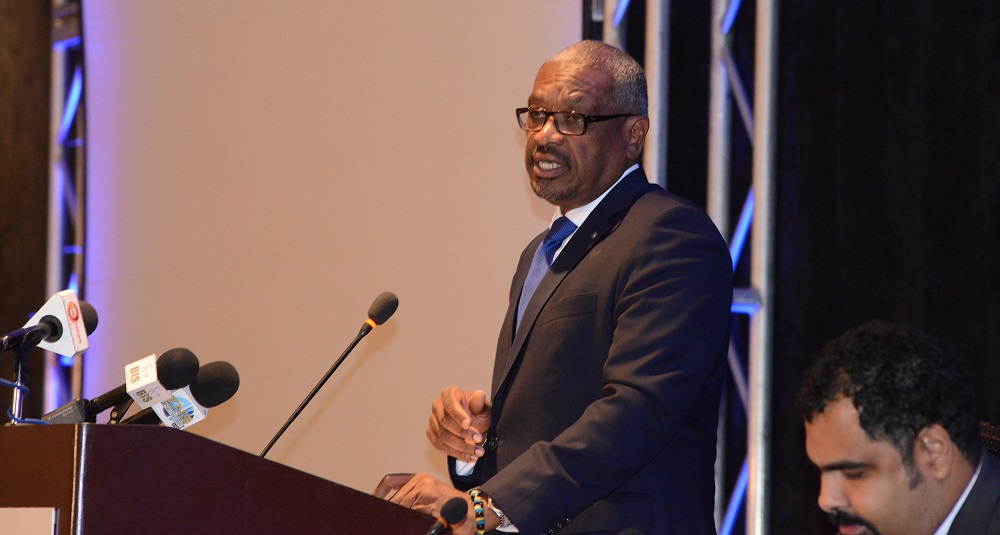#Bahamas, November 14, 2017 – Nassau – The Government of The Bahamas is in the process of moving away from the cash-based form of accounting it presently employs to an accrual based accounting system, Prime Minister Dr. the Hon. Hubert A. Minnis said Monday. The move, which is foreshadowed to be implemented at the end of June, 2022 for full central government transitioning to accrual accounting and then 2023 for the public sector at large, is expected to better strengthen the Government’s accounting framework by ensuring greater transparency and accountability in public sector finances, while allowing officials to better monitor government debt and liabilities.
An accrual method of accounting records revenues and expenses when they are incurred, regardless of when cash is exchanged. The term “accrual” refers to any individual entry recording revenue or expense in the absence of a cash transaction.
Prime Minister Minnis said the new system would also allow for government’s use of high-quality information to make informed and sound spending decisions, while properly managing the nation’s assets and liabilities. Addressing a Bahamas Institute of Chartered Accountants Seminar Monday (November 13, 2017) at Melia Nassau Beach resort, Prime Minister Minnis said the current system of accounting employed is “woefully lacking” in providing government with a complete and accurate view of financial activities and reporting.
“As many of you know, the Government still uses the cash basis of accounting in compliance with IPSAS (International Public Sector Accounting Standards); cash basis is woefully lacking in providing us with a complete and accurate view of financial activities and reporting,” Dr. Minnis said.
“As policymakers, we value the importance of financial reporting that meets international standards. It is essential that we are in a position to utilize high-quality information to make informed and sound spending decisions, while properly managing our assets and liabilities.
“This is critical to us securing more sustainable public sector finances, achieving greater credibility in policymaking and building a more durable economic future for our country. It is also vital to delivering on acceptable levels of transparency and accountability in government’s financial management,” Prime Minister Minnis added.
Dr. Minnis said the Government’s resolve in this regard is underscored by the prominence it has given to fiscal responsibility, transparency and accountability in its governing mandate.
“To provide an update to our efforts, the Government’s Working Group produced a concept paper outlining the road map for the implementation of accrual-based accounting and the implementation of International Public Sector Accounting Standards for budgeting, accrual accounting and financial reporting.
“Moving to accrual-based accounting will ensure greater transparency and accountability in public sector finances, as well as, a better monitoring of government debt and liabilities.
“The potential harm of the absence of these prudent practices were exposed in our recent assessment of the fiscal outcome for Fiscal Year, 2016/2017. As you know, high levels of unbudgeted expenditure arrears are poised to elevate the actual overall fiscal deficit some five times higher than originally budgeted. The lack of transparency and accountability inherent in cash basis accounting is unsustainable and breeds mistrust,” Prime Minister Minnis added.
Prime Minister Minnis said coincident with the exercise to improve financial reporting, the Government also has a roadmap to modernize and align the existing chart of accounts (COA) with best practices and the International Monetary Fund’s Government Finance Statistics reporting standards.
Work on the COA re-design, which commenced in 2014, is expected to be completed and fully implemented, for July 1, 2018. (A chart of accounts [COA] is a financial organizational tool that provides a complete listing of every account in an accounting system.)
“In the 2017/2018 Budget Communication, the Government announced plans to introduce fiscal rules as a means of achieving a credible and sustainable reduction in the fiscal deficit and the debt position,” Prime Minister Minnis said.
“With the assistance of the IMF, we are making progress in defining a sound framework that will include controls on certain recurrent expenditures; taking more decisive steps with pension reform and better managing subsidies to our state-owned enterprises.
“Successful implementation of this framework depends on our ability to measure our performance which is contingent upon having the proper financial management systems to provide the data needed for analysis, but transitioning public financial reporting to accrual-basis accounting is no small feat. We have targeted a date of end of June 2022 for full central government transitioning to accrual accounting and then 2023 for the public sector at large,” Prime Minister Minnis added.
By: Matt Maura (BIS)
Photo caption: Prime Minister Minnis addressing Bahamas Institute of Chartered Accountants Seminar, November 13, 2017 at Melia Nassau Beach.
(BIS Photo/Peter Ramsay)
—


















